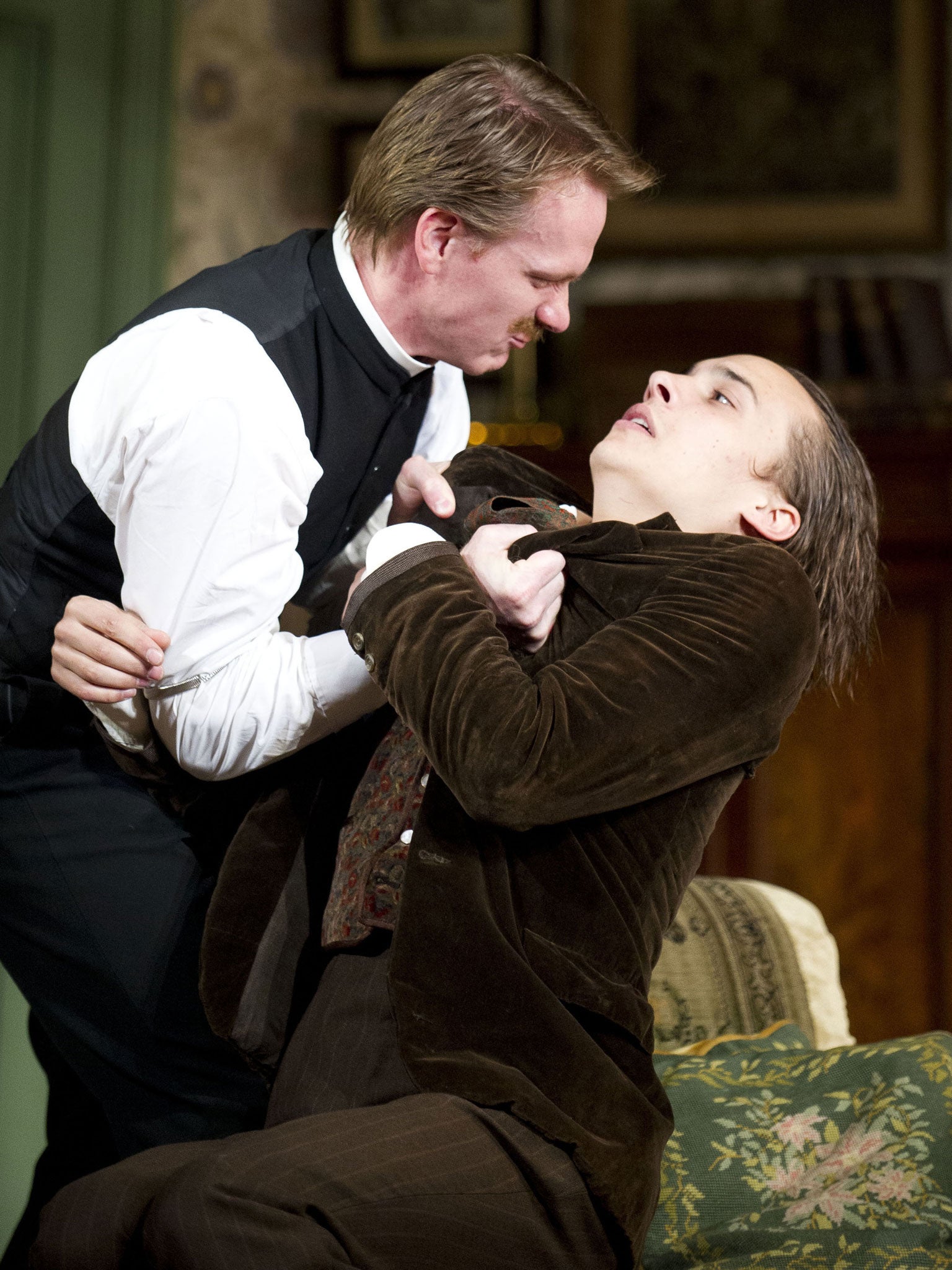Theatre review: Candida - frustrated vicar seeks good times
Shaw's tale of the cleric, the scoundrel and the comely wife is about 60 years ahead of its time

A chaise longue stretches, like a languorous temptation, across the middle of Reverend James Morrell’s drawing room. In Candida – George Bernard Shaw’s rarely staged yet surprisingly gripping 1894 portrait of a marriage, revived at Bath Theatre Royal by director Simon Godwin – we first see the cleric beavering at his desk, apparently deeply contented.
An egalitarian socialist in a dog collar, he has a devoted secretary, Miss Garnett, at his side, helping to schedule his sermons and lectures on the London circuit. He is, moreover, blessed with a beautiful wife, Candida (Charity Wakefield), whom he deems pure as the driven snow – especially compared to her father (Christopher Godwin), a shameless capitalist scoundrel.
Besides helping her spouse and the household servants with chores, Candida tends Morrell’s latest protégé. Frank Dillane’s Marchbanks is a young aristocratic poet, a lovelorn runaway saved from sleeping rough. With his boho attire and battered shoes, snake-thin body and hair slicked down his neck, Dillane looks like a cross between Arthur Rimbaud and Johnny Depp, or the serpent in Eden as painted by Hugo van der Goes. He lurks in the shadows of Mike Britton’s unsettling set, on which bookcases slant within a skewed, gilded proscenium arch.
Marchbanks soon ruins Morrell’s domestic bliss, scorning the reverend’s homilies and threatening to seduce Candida with his more romantic notions.
What’s startling is how – if it weren’t for the bustles, waistcoats and watch fobs – you might think Shaw’s protagonists were from the 1960s. Notably so, when Candida considers the options of open marriage or assertive lover-swapping, and when Marchbank argues for more amorous affairs and frank talk. In fact, Shaw’s drama reminds you how incipiently revolutionary the fin de siècle was – with the emergence of women’s lib emerging and “the talking cure” proposed by Freud’s mentor, Josef Breuer.
Marchbank himself functions like a proto-psychoanalyst, enticing Jo Herbert’s amusingly uptight Garnett to discuss her desires on the couch, while Dillane’s demonic menace is riveting. However, it must be said that Shaw’s dénouement – whilst offering a variation on Ibsen’s A Doll’s House – feels a tad confused, perhaps because the writer was sexually screwed-up himself. Or is there something inept about the engineering of this drama, about how our sympathies are tilted? Rather than coming over as thoroughly decent, should Jamie Parker’s Morrell be more pompous, or insecure? Does Wakefield’s Candida – with her sing-song intonation – need to hint at more frustration? Still, I was rather enthralled by the weird lurches between suspense and farce in this seriocomedy.
Candida was, we gather, always a sucker for fairytales, so maybe she’d have liked The Paper Architect, devised by the co-designer-director duo Davy and Kristin McGuire. Presented as part of the Beyond Barbican season, this is a chamber piece tucked away in a cubbyhole at the Leytonstone Library in east London. John Cording plays an aged, shuffling recluse, living in a fantasy world that he’s constructed out of cut-and-folded paper and sentimental memories.
The McGuires’ miniature, frost-white paper sets are exquisitely pretty and technically impressive: a row of townhouses complete with tiny lampposts that glow in the dark; a backlit forest of 3D willow trees, with silhouetted animations scampering around.
It was clearly its innovative mix of media that won The Paper Architect this year’s Oxford Samuel Beckett Theatre Trust Award. But the McGuires prove clueless when it comes to scriptwriting and dramatic momentum, and the forest scene is soon swamped by computer-generated clichés and gloop. Dawn rises behind the wood like a nauseatingly tangerine cocktail as we watch a boy-meets-girl romance in which she removes her clothing while he watches from the bushes. Tacky and twee.
In the 1960s, the radical, left-field Living Theatre troupe encouraged folks to shout “Paradise now!” in the street. That’s becomes the muted closing refrain in what happens to the hope at the end of the evening, performed and co-devised by Tim Crouch and Andy Smith at Islington’s experimental Almeida Festival.
Apparently playing himself, Smith – a rotund beardie – sits reading from a script, minimally re-enacting a reunion with an old mate (the shorn-headed Crouch, off-book and on his feet). The latter fetches up at Smith’s marital home in Lancashire, after years of no contact. They used to attend anti-fascist rallies together, we glean. However, the old mate is now cracking up – combative and needy by turns. Smith remains aloof, saying he has found serenity. Breaking the fourth wall, he further muses that the theatre is one remaining place where we can socially connect and learn to live better.
This two-hander may mildly try your patience with its deliberately long pauses. However, the quiet and spartan aesthetic is more often absorbing. As for the virtues of the theatre, it’s a big claim seriously mooted but also subtly doubted here – for Smith may, when all’s said and done, be a lousy friend.
‘Candida’ (01225-4488844) to 20 July; ‘The Paper Architect’ (0845 120 7511) to 21 July; ‘What happens to hope at the end of the evening’ (020-7359 4404) to 18 July
NEXT WEEK A revolution turns sour in A Season in the Congo
Critic’s choice
Staged in a deconsecrated church – St Peter’s, Ancoats – Manchester International Festival’s Macbeth (to Sun) is a curate’s egg but still a hot ticket, with Kenneth Branagh in the title role. It’s additionally being screened live in UK cinemas this Sat (under the NT Live banner). Murderous rotters raise more laughs in The Ladykillers, back at London’s Vaudeville, with Angela Thorne and Simon Day (to 26 Oct).

Join our commenting forum
Join thought-provoking conversations, follow other Independent readers and see their replies
Comments
Bookmark popover
Removed from bookmarks